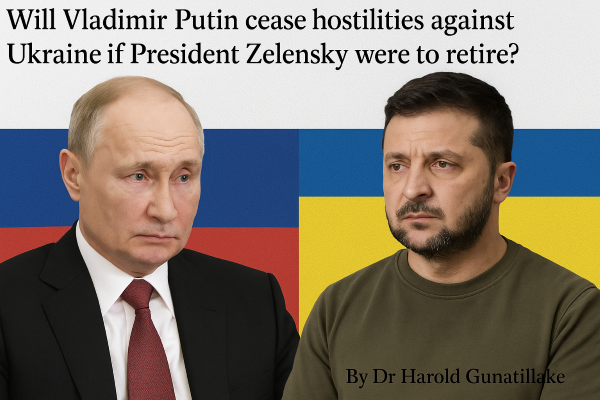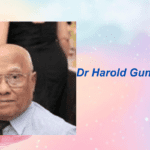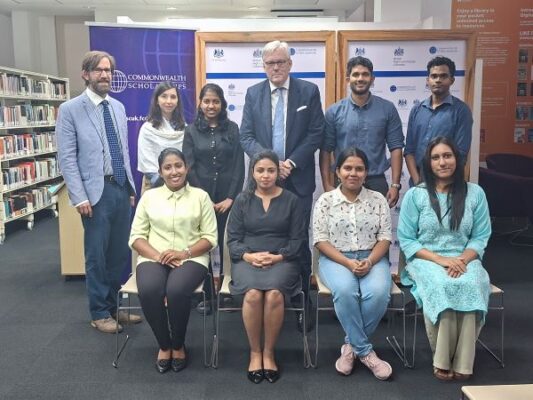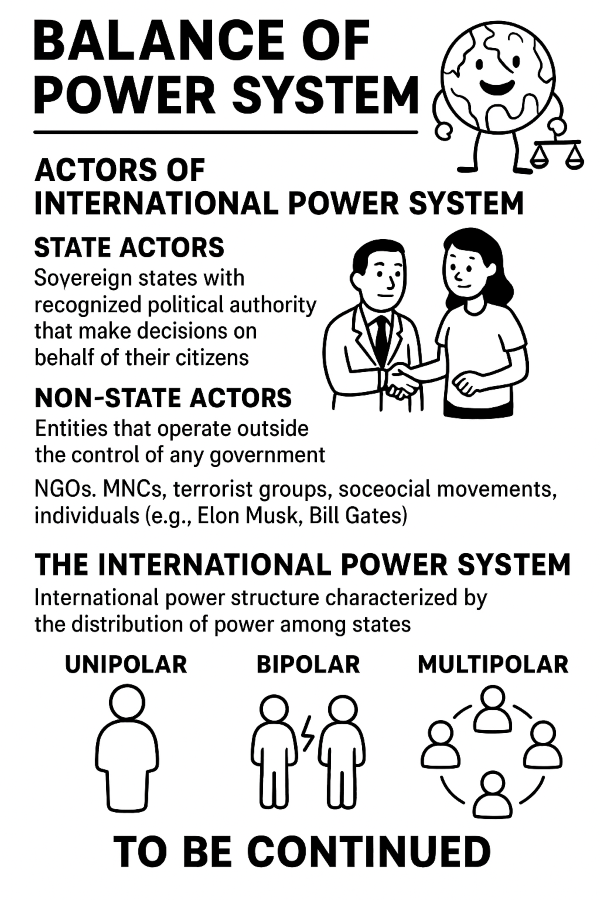Will Vladimir Putin cease hostilities against Ukraine if President Zelensky were to retire? – By Dr Harold Gunatillake
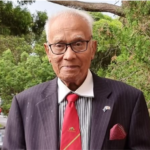
Exploring the Impact of Leadership Change on the Russia-Ukraine Conflict
The conflict between Russia and Ukraine, initiated in earnest with the annexation of Crimea in 2014 and significantly escalated through Russia’s full-scale invasion in February 2022, is based on a complex interplay of historical, political, and strategic factors. As the conflict persists, many analysts and observers ponder whether a change in Ukraine’s leadership—specifically the retirement or resignation of President Volodymyr Zelensky—might result in a cessation of hostilities by Russian President Vladimir Putin.
The Roots of the Conflict
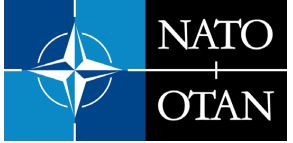 The ongoing conflict originates from Russia’s persistent apprehensions regarding NATO’s eastward enlargement, Ukraine’s increasing
The ongoing conflict originates from Russia’s persistent apprehensions regarding NATO’s eastward enlargement, Ukraine’s increasing
affiliations with Western nations, and Moscow’s aspiration to sustain influence over its neighbouring state. President Zelensky, who was elected in 2019, has consistently championed Ukrainian sovereignty, democratic principles, and enhanced integration with Europe. His leadership has come to symbolise Ukraine’s resilience and resolve.
The Role of Leadership in Wartime
Leadership unquestionably plays a crucial role during wartime, influencing both domestic morale and the international community’s response. Zelensky’s determination and communicative abilities have invigorated Ukrainian society and garnered substantial military, economic, and humanitarian assistance from Western nations. His departure, whether through retirement or resignation, would constitute a significant milestone for Ukraine.
Nevertheless, the origins and persistence of the conflict are rooted in broader strategic objectives, rather than the actions of any individual. Russia’s articulated war goals—such as preventing Ukraine’s NATO accession, securing recognition of the annexed territories, and ensuring a pro-Russian government in Kyiv—are driven by strategic interests rather than personal vendettas against President Zelensky.
Image Source : bolde
Ukraine is not a member of NATO, but it is a partner country actively working towards membership.
While NATO allies have affirmed Ukraine’s future within the alliance and support its path to membership, an invitation to join will be extended when conditions are met and Allies agree.
Ukraine’s Aspirations:
Ukraine has historically pursued NATO membership, formally requesting an expedited accession process following Russia’s invasion in 2022.
NATO’s Stance:
NATO has consistently affirmed that Ukraine’s future lies within the alliance and that it will support Ukraine’s progress toward membership.
Path to Membership:
Although Ukraine was formerly obliged to undergo a Membership Action Plan (MAP) as a preliminary step toward membership, this prerequisite was eliminated at the 2023 Vilnius Summit.
(The announcement by Donald Trump on July 14 regarding the provision of modern American weapons to Ukraine—initially financed by European NATO members before being transferred— constitutes a significant policy shift. Although it does not offer immediate solutions on the
battlefield, it presents an important strategic development opportunity.)
Image Source : nationalinterest
Would Putin Stop If Zelensky Retires?
- While some may speculate that new leadership in Ukraine could facilitate negotiations or a potential compromise, the majority of analysts concur that the conflict is unlikely to conclude solely due to Zelensky’s resignation. Several pivotal considerations underpin this assessment:
- Strategic Objectives: The Russian government, headed by Vladimir Putin, has articulated demands and goals that extend well beyond opposition to Zelensky as an individual. These encompass territorial claims, security assurances, and influence over Ukrainian policy.
- The legal basis supporting Ukraine’s assertion of territorial integrity by its borders established in 1991, as well as the reintegration of its occupied territories, is both strong and International law explicitly states that Russia’s occupation and annexation of Ukrainian territories lack legal legitimacy. This is reinforced by prohibitions against territorial acquisition by force, principles of self-determination, and the reaffirmation of Ukraine’s borders through international agreements, thereby maintaining Ukraine’s sovereignty unwaveringly.
- Ukrainian Resistance: Public opinion within Ukraine strongly opposes Russian occupation and the erosion of sovereignty, irrespective of the Any new leader attempting to compromise on these issues significantly would likely encounter widespread domestic opposition.
- International Factors: Western assistance to Ukraine is not contingent upon Zelensky personally but is instead rooted in broader principles of international law and territorial integrity. The resignation of Zelensky would not necessarily alter the strategic considerations of nations providing aid and diplomatic support.
- Russian Narrative: Russian state media and official rhetoric frequently portray the Ukrainian government as illegitimate or subordinate to Western influence. The change in leadership alone would not address these narratives or modify Russian policies.
Possible Outcomes of a Leadership Change
- Should President Zelensky retire, several potential scenarios may emerge:
- A new administration could uphold the existing stance, persist in resistance, and continue to seek support from international allies.
- Alternatively, a successor might endeavour to engage in negotiations with Russia; however, this would likely necessitate substantial concessions, which could prove unacceptable to the Ukrainian populace.
- Russia might exploit the transitional phase to escalate military activities or attempt to establish a more favourable Ukrainian government, thereby potentially inciting further instability.
Russian Stated Objectives and Actions
Since the onset of the invasion, the Russian leadership has articulated a range of objectives, including the “demilitarisation and denazification” of Ukraine and the protection of Russian-speaking populations. Official statements from the Kremlin have, at various junctures, emphasised the recognition of certain occupied regions— such as Crimea, Donetsk, Luhansk, Kherson, and Zaporizhzhia—as integral parts of Russia. Nevertheless, these claims lack international recognition, and substantial portions of Ukrainian territory remain under Ukrainian sovereignty.
Conclusion
The retirement of President Zelensky, while significant, would not resolve the underlying causes of the war between Russia and Ukraine. The conflict is rooted in deep-seated strategic interests and national identities that transcend individual leaders and their administrations. Peace will likely require a comprehensive agreement involving security, territorial, and political issues—not merely a change of faces at the top of Ukraine’s government.
Predictions about the end of the war in Ukraine and Russia’s ultimate objectives remain speculative. While concerns about Russian territorial ambitions persist, given past and current actions, the claim that the war will continue until all of Ukraine is part of Russia is not based on confirmed official policy and should be regarded as an interpretation rather than a fact. Continued observation of developments, careful analysis of official statements, and consideration of the broader geopolitical context are necessary for a nuanced understanding of this complex conflict.



